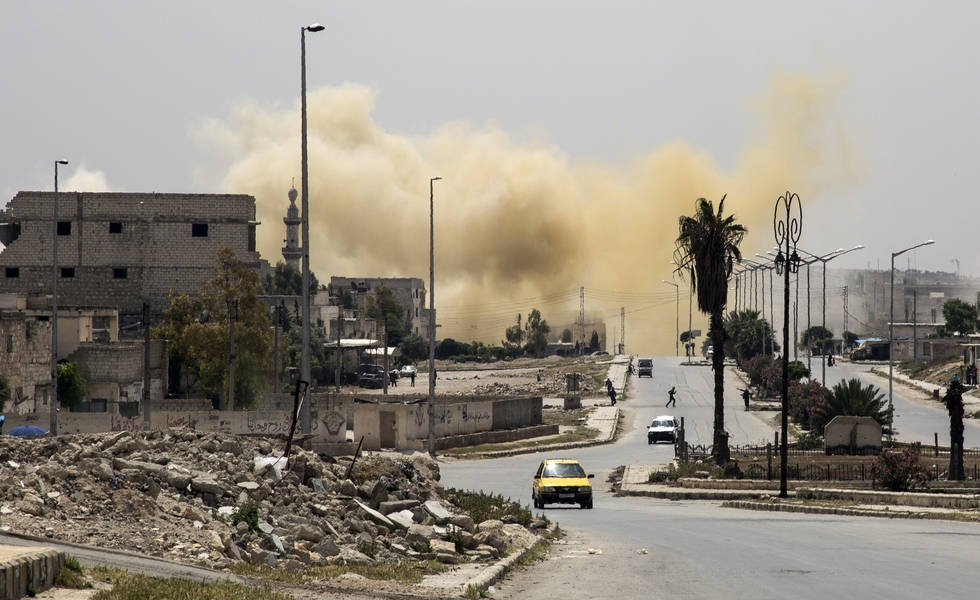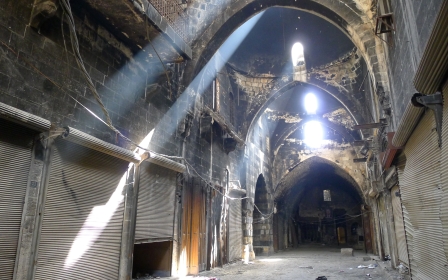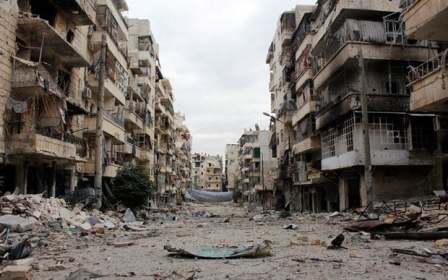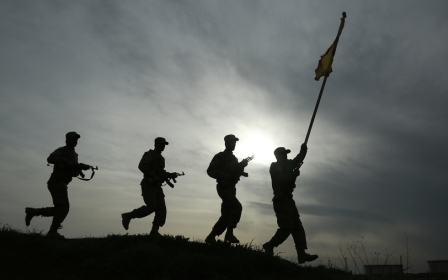Fighting rages in Aleppo as Obama calls for 'reinstated' Syria truce

Government and rebel bombardments killed 26 civilians on Sunday in Syria's second city Aleppo as US President Barack Obama urged the conflict's warring parties to "reinstate" a troubled ceasefire.
Eight weeks into the declared truce between President Bashar al-Assad's government and opposition rebel groups, violence has escalated around Aleppo, with dozens killed by government air strikes and rebel rockets.
The surge in fighting and stalled peace talks in Geneva have dimmed hopes that the ceasefire would lay the groundwork for finally resolving Syria's devastating five-year conflict.
On Sunday, Obama said he had spoken to his Russian counterpart - a key Assad ally - to try to shore up the truce. "I spoke to President Vladimir Putin early last week to try to make sure that we could reinstate the cessation of hostilities," he told reporters in Germany.
Salem Meslet, spokesman for the main opposition High Negotiations Committee (HNC), called on Putin to hold its Damascus allies to the terms of the ceasefire, the Associated Press reported. "The key to ending these attacks, and to making progress in the talks, lies in Moscow," Meslet said.
After at least 27 reported civilian deaths in government bombardment across Syria on Saturday, a fresh barrage of air strikes hit Aleppo around midday Sunday.
Twelve civilians died after a strike hit an open-air fruit and vegetable market, the Syrian Observatory for Human Rights monitoring group said.
'Attack on Geneva process'
Emergency responders, known as the White Helmets, said they were "exhausted" by the past three days of bombing in Aleppo city.
"We're back to working 24-hour shifts after we started working shorter hours because of the truce," one volunteer said.
According to the Observatory, four more civilians died Sunday in strikes on other opposition neighbourhoods.
In Aleppo's western government-held parts, ten civilians including a woman and two children were killed early Sunday by rebel rocket fire, the Observatory said.
While officials have yet to declare the ceasefire dead, Observatory head Rami Abdel Rahman said the escalating violence in Aleppo and elsewhere meant it had effectively collapsed.
Peace negotiations scheduled to continue in Geneva until Wednesday have faltered since Syria's main opposition group last week suspended its official participation in the talks.
The HNC walked away from negotiations in frustration at the devastating humanitarian situation on the ground.
"The Assad regime's bombing offensive is not only a brutal attack on Syrians, but an attack on the Geneva process that is the only possible pathway to peace," HNC spokesman Meslet said on Sunday in an emailed statement.
"These negotiations resumed on the basis of a cessation of hostilities, but for increasing numbers of our citizens there is an escalation of regime violence."
The truce, brokered by Russia and the United States, was part of the biggest diplomatic push yet to resolve Syria's conflict, which began in March 2011 with widespread anti-Assad protests.
It has since spiralled into a multi-front war that has killed 270,000 people and drawn in regional and world powers.
Ground troops 'a mistake'
In an interview with the BBC aired Sunday, Obama warned Western governments should not send troops to topple Assad's government.
"Syria has been a heartbreaking situation of enormous complexity, and I don't think there are any simple solutions," he said in London.
"It would be a mistake for the United States, or Great Britain, or a combination of Western states to send in ground troops and overthrow the Assad regime."
He urged all parties "to sit down at the table and try to broker a transition".
Obama first urged Assad to step down in August 2011, but has resisted calls by critics to use American military force to end the Syrian leader's rule.
Washington did, however, launch air strikes in mid-2014 against the Islamic State (IS) group after it seized large parts of Syria and neighbouring Iraq.
IS has suffered several major defeats in Syria's north at the hands of the Kurdish People's Protection Forces and allied groups.
But in the northeastern city of Qamishli this week, Kurdish militia turned their weapons on Syrian government forces in a rare bout of fighting between the two sides.
The clashes began Wednesday with a scuffle at a checkpoint and according to Kurdish security forces, have killed 17 civilians, 10 Kurdish fighters and 31 government troops and allied militiamen.
Kurdish security forces said they had also arrested 102 members of pro-government forces.
After several days of mediation, government officials and Kurdish representatives agreed Sunday to swap an unspecified number of prisoners and to maintain a local truce.
Kurds will keep the positions they seized during the clashes, including a prison, the source said.
New MEE newsletter: Jerusalem Dispatch
Sign up to get the latest insights and analysis on Israel-Palestine, alongside Turkey Unpacked and other MEE newsletters
Middle East Eye delivers independent and unrivalled coverage and analysis of the Middle East, North Africa and beyond. To learn more about republishing this content and the associated fees, please fill out this form. More about MEE can be found here.




